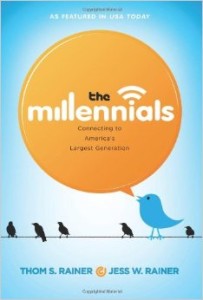
This book is subtitled, “Connecting to America’s Largest Generation”. As suggested, the millennial generation has surpassed the Baby Boomer numbers. As a church or business leader, it is important to understand the shifting mindset of this group. Two of my three children are from this generation and I can vouch for the fact that things are very different than they were with my Boomer parents. Obviously the world has changed, but it’s so much more than that; their minds have changed.
I love working with high school and college students, most of which are currently millennials. When I was given this book, I was excited. I am always looking for ways to connect and improve my communications with young people. As I read the book, I was let down. First of all, this book only studied the older half of the Millennial Generation (those born between 1980 and 1990). Secondly, this 284 page book could have been condensed to 5 pages of statistics followed by 25 pages of quotes and supporting documentation. The book was extremely repetitive and not well written. It jumps between the first person of 2 different authors and 3rd person without clear transitions. Simple language is made complex through irrelevance. I am confident that there are better sources for the information I am desirous to learn about this generation. Nonetheless, I like to finish what I start and glean whatever I can; so, I did highlight a few items during my reading:
- Millennial Generation, a group of young people whose birth years range from 1980 to 2000.
- If a Millennial does achieve wealth, fame, or power, it is a means to a greater good than an end in and of itself.
- Only 13 percent of Millennials considered any type of spirituality to be important in their lives.
- The Millennials rarely describe someone first by their skin color or by their ethnic origin. That’s not what is at the foremost of our minds.
- Among the Millennials who are self-described Christians, only 18 percent said their religion was important to them. Among those who held to basic Christian doctrine (the majority of self-described Christians do not), only 38 percent said their faith was important.
- This young generation was also clear on their expectations of the federal government. They wanted more centralized power in the government, and they thought Obama would more likely deliver on that expectation. Different exit polls generally demonstrated that eight out of ten wanted a stronger governmental role in our lives.
- Millennials by a 71 percent to 29 percent margin thought the federal government should guarantee health-care coverage for all Americans.
- It seems like every time I read about a Christian leader, he’s telling people what he’s against. It just all seems so negative – quoting a Millennial
- Religion is thus viewed by many of the Millennials as just another divisive force in the world.
- Music, Internet, and television each outranked religious beliefs, a spouse, and a boss in terms of influence.
- Nearly three-fourths of the generation call themselves spiritual but not religious.
- The news of the morning paper is old. It happened yesterday. They already know the events from the previous day. It’s time to move forward.
